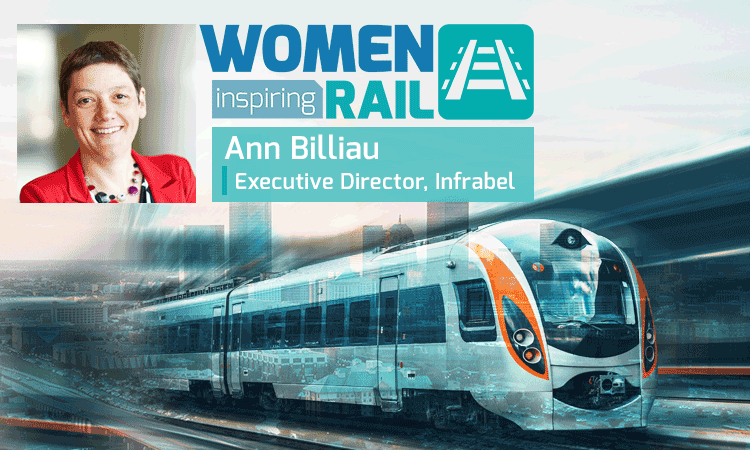Women Inspiring Rail: A Q&A with Ann Billiau, Executive Director, Infrabel
Posted: 24 September 2019 | Ann Billiau | No comments yet
Ann Billiau, Executive Director of Infrabel, and the Director of its Traffic Management & Services Department, explains that the human interaction aspects of her job is what keeps the role varied and enjoyable, and that a job in this industry has many layers – which never makes it boring.


How did your career in rail begin and what does your current job involve?
Having completed a degree in Mathematical Sciences and obtaining a postgraduate diploma in Geophysics at the Université Catholique de Louvain-La-Neuve, I joined the Belgian railways in 1993. I was recruited to develop IT programmes for rolling stock maintenance and rolling stock maintenance workshops. After a few years, I became a Project Manager, then the Head of a development cell managing several different projects. In 2005, when the old unitary SNCB was divided into three different companies, I left the IT Department to work for the infrastructure manager, Infrabel. Initially, I held a managerial role in which I was responsible for all contact with the rail companies. Since the liberalisation of the rail sector was, at that time, in its infancy in Belgium, it was a real challenge.
In October 2011, I became a member of Infrabel’s Executive Committee, where I was responsible for Network Access. It was an extension of what I had helped implement since 2005. My areas of activity included relations with rail companies and allocation of train paths, as well as operational safety and punctuality.
In November 2013, Infrabel also asked me to take on real-time traffic management. Since then, and to the present day, I have been the Director of the Traffic Management & Services Department (client management, safety management punctuality management, capacity allocation and real-time traffic management).
What aspects of your job do you find the most challenging/rewarding, and why?
The areas of activity that I manage today are numerous and varied. Some are rather technical, others are operational, and others mostly focus on relationships with customers. I am particularly motivated by the diversity that all these roles offer me.
I am involved in a little bit of everything, however, when I have the time and the opportunity, I can look in greater depth into a specific matter; I learn something new every day.
I am involved in a little bit of everything, however, when I have the time and the opportunity, I can look in greater depth into a specific matter; I learn something new every day.
My essential role is to motivate the teams to reach our objectives and to make the railway sector a modern one that matches the realities of daily life, and that meets the needs of our clients and society as a whole.
I particularly enjoy the aspect of human interaction. Whether it is contact with the rail operators or industrialists circulating in Belgium, or with the colleagues working for Infrabel, the discovery of what each of them can bring to the system as a whole is a source of wealth and discussions that are often passionate and always inspiring.
The significant challenges that we currently face are a complete overhaul of the management process of works on the network, as well as the introduction and development of a ‘customer-oriented’ culture throughout Infrabel.
What is it about the rail industry that you are most passionate about?
What I like in the rail sector, is that there are so many different roles and specialisms. Even working for the same company for 26 years, every day is a discovery. My career has already allowed me to wear several different hats and each of them has brought numerous challenges to be overcome. It is never boring.
My career has already allowed me to wear several different hats and each of them has brought numerous challenges to be overcome. It is never boring.
What has been your biggest achievement/proudest moment so far in your rail career?
There have been several highlights in my career. However, if I had to choose just one, it would be the most recent: The entry into production of our new real-time traffic management tool.
There have been several highlights in my career. However, if I had to choose just one, it would be the most recent: The entry into production of our new real-time traffic management tool. It is a project that has been developed over several years and that has allowed us to bring Infrabel to the leading group of European traffic managers. This project has allowed us to embark on the discovery of what was happening in other countries, to select the best practices and to implement them in Belgium. The weekend that we moved from the old system to the new system without interrupting the rail traffic remains, for me, an unforgettable moment. The tensions and stress a few days before the launch, with uncertainty down to the last minute, and then the great leap into the void, the fear in the pit of your stomach, in the middle of the night of Saturday to Sunday, to achieve a magnificent success that is the fruit of the work of an exceptional cohesive and supportive team. I will never be able to express how much I appreciate their devotion and dedication.
How has the rail industry evolved since you joined? What have been the biggest changes?
Personally, I think it is technology that has changed the most. When I entered the railway sector, we still designed the train-paths on a distance-time graph with pencil and paper. We managed the traffic from 368 signal boxes with relatively old technologies. Today, our environment has been modernised and automated in spectacular ways. There will soon be no more than 10 boxes on the Belgian railway network and the ETCS system will be available everywhere. This process is ongoing and currently one quarter of our main tracks are equipped with this technology. The implementation of ETCS will allow us to take a great step forwards in terms of safety. These modernisations will make us much more effective and allow us to offer our clients a better service.
With the hyper-rapid evolutions that we face today, I think that if we want to avoid missing the train of the future, we need to make optimal use of what we have today and dare to investigate innovations that others might already have discovered.
An element in which I believe that there are still improvements to be made within the railway sector, is our openness to the world. We often tend to re-invent the wheel; to think that our sector is so specific that we need something uniquely designed and engineered for us. With the hyper-rapid evolutions that we face today, I think that if we want to avoid missing the train of the future, we need to make optimal use of what we have today and dare to investigate innovations that others might already have discovered.
Who within the rail community has been an inspiration to you, and why?
I have been nurtured by several sources and this is what has allowed me to grow within the railway sector; to spread my wings and to get where I am today.
Whether it is my direct bosses and patrons in the different roles I have held, the people I meet regularly in the field, our clients and their experiences on the railway, or even experts working in other sectors, they all have something to say, to demonstrate, to teach. It is down to each of us to be receptive enough to hear what they have to impart.
What can be done to diversify the workforce in the rail sector? What advice would you give to those thinking about pursuing a career in rail?
It is true that the railway sector has a reputation for being a job for ‘strong, butch men’. But don’t you believe it! There are more and more of us women maintaining our roles and demonstrating that we fully deserve it. Whether in managerial roles, office jobs or in the field. I have had the opportunity to meet several women ‘in the field’ at Infrabel, and I assure you that they are worth their weight in gold and have nothing to envy of any man. We are generally very warmly welcomed by our male colleagues that look favourably on this diversity.
Diversity is and will always be a source of wealth and a way to excel oneself.
During a seminar on diversity organised by Infrabel, I discovered a Creole expression that touched me deeply: ‘Moun Ki Moun’. This means ‘the differences of individuals create the wealth of us all’. Diversity is and will always be a source of wealth and a way to excel oneself.
How can we attract more women and increase this diversity within the business? By demonstrating that it is possible, that we can construct our own lives to make a rich and varied career within this sector, while managing to achieve work-life balance.
The railway is a marvellous world with an indisputable future ahead of it. There is much to be done, and much to prove!
If you would like to take part in the Women Inspiring Rail series, or would like to nominate a colleague to part, please email: Craig Waters, Editor, Global Railway Review.







